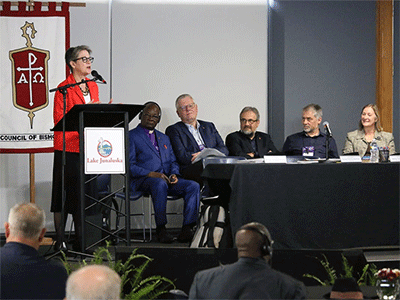Ongoing uncertainties and a new breakaway denomination are putting a strain on The United Methodist Church’s ecumenical relationships.
During its November meeting, the Council of Bishops heard how the denomination’s situation is affecting relations within the World Methodist Council and plans for a full-communion agreement with The Episcopal Church. They also took actions intended to strengthen ties.
Your support of the Episcopal Fund apportionment helps pay the salaries and benefits of United Methodist Bishops and allows them to travel across their episcopal areas providing mentorship and leadership.
In addition, the bishops heard from episcopal colleagues from Africa and Europe about why ecumenism — collaboration and work toward unity with other Christians — is so important to United Methodists in the first place.
“Jesus prayed that all may be one,” explained David N. Field, a member of the Council of Bishops ecumenical staff, quoting John 17:21. “Visible unity of our churches can break down barriers and provide embodiment of the Gospel, so that the world may believe.”
The word “ecumenical” derives in part from the Greek word for house, οἶκος — the basic idea being that Christians should strive to be under one roof. But at this point, The United Methodist Church is dealing with the fact that a number of congregations no longer want to be under its roof.
As of Nov. 16, more than 6,900 U.S. congregations have received the necessary approvals to disaffiliate under a church law that allows congregations to leave with property if they meet certain financial and procedural obligations. That represents nearly 23% of The United Methodist Church’s U.S. congregations departing since the provision took effect in 2019.

Churches in other parts of the world are either leaving The United Methodist Church or preparing to depart. Conferences — church regional bodies — in Russia, Belarus, Kyrgyzstan, Kazakhstan and the Czech Republic are in the process of becoming autonomous from The United Methodist Church.
The bishops also took another action to address a concern within the World Methodist Council after the Global Methodist Church has asked for observer status within the group.
The World Methodist Council is an ecumenical body of 80 denominations around the globe that trace their roots back to John Wesley’s Methodist movement. The United Methodist Church is both the largest member and provides most of the funding for the ecumenical group, which is headquartered near where the bishops met in Lake Junaluska.
The bishops agreed to send the following response to the World Methodist Council:
“In the spirit of the values of the World Methodist Council, the Council of Bishops of The United Methodist Church encourages all requests from those applying for membership in the World Methodist Council when those applying mutually recognize all churches in the WMC as valid Christian expressions and as valid expressions of the Wesleyan Tradition.”
The Council of Bishops also asked the World Methodist Council to clarify how member churches are in communion with each other.
The Rev. Jean G. Hawxhurst, a Council of Bishops ecumenical staff member who works with the World Methodist Council, said the ecumenical group is being very thoughtful with the Global Methodist Church’s request and welcomes input.
“They are aware, they are caring, and they’re trying to do a good job with this,” Hawxhurst said.
She said the ecumenical group’s steering team will take up the request and questions about membership just ahead of the World Methodist Conference, the group’s big meeting scheduled for Aug. 13-18, 2024, in Gothenburg, Sweden.
Before the World Methodist Conference meets, The United Methodist Church will hold its own General Conference on April 23-May 3 in Charlotte, North Carolina. There, it will have the chance to vote on a full-communion agreement with The Episcopal Church, submitted by the Council of Bishops.
Full communion means each denomination acknowledges the other as a partner in the Christian faith, recognizes the validity of each other’s baptism and Eucharist, and commits to work together in ministry. Such an agreement also means Episcopalians and United Methodists can share clergy.
The United Methodist Church already has full-communion agreements with the Evangelical Lutheran Church in America, the Uniting Church in Sweden, five historically Black Pan-Methodist denominations and the Moravian Church in North America.
excerpt from a story by Heather Hahn, assistant news editor, UM News.
One of seven apportioned giving opportunities of The United Methodist Church, the Episcopal Fund pays for bishops’ salaries, office and travel expenses, and pension and health-benefit coverage. Please encourage your leaders and congregations to support the Episcopal Fund apportionment at 100 percent.





